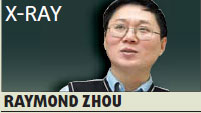
In 2008, Ma Wei started to teach a new course at Wuhan Polytechnic University. It was called "Architecture and Feng Shui", an elective course designed to address urban development and locations of buildings. It was very popular with students, with 80 enrolling for the first semester and 130 for the second.

Then the course was canceled. In a sense, it became the victim of its own success.
The school authority had used the course for publicity, and when a media backlash came it decided to "hide from the thrust of the wind", to borrow a Chinese term.
The 34-year-old teacher said it had nothing to do with him: "I'm the person who was buried as a funeral object."
Feng shui is literally wind and water, two of the most crucial elements in the Chinese scheme of the cosmos. For much of the 20th century, it was considered superstition. And superstition was the name of the offense as lobbed against it in the hailstorm of public opinions and authority anxieties.
Is feng shui science?
It depends on whom you ask this question. Chen Zhihua, a professor at Tsinghua University and expert on rural architecture, contends that feng shui is "out-and-out superstition". Its popularity is the result of people wanting to jump on the bandwagon. And he continues: "This is just like the craze for guoxue, the study of Chinese classics. And how many really understand it?"
It's funny he should bring up guoxue because feng shui seems to fall neatly into its realm. Yet, guoxue has been so hallowed in recent years that any badmouthing would be met with instant and fierce retaliation. Even Chen himself did not cite guoxue as analogous to feng shui, but he certainly implied it, leaving himself enough room for self-defense.
The controversy reminds me of Rodgers and Hammerstein's The King and I, in which the king frequently uses the word "scientific" to describe anything as rational and progressive. During the initial clash between traditional Asian values and Western-style science - be it in Thailand or China - science was a juggernaut that threatened to crush anything "unscientific".
And science did play a major role in helping Asian countries advance to a new stage of social development. In many areas, thousand-year-old habits, such as foot-binding, were mercifully discarded because they did not conform to scientific thinking.
But science is not a fait accompli. It is constantly evolving and making new discoveries. Still, there are lots of things science cannot explain or remedy. If anything unaccounted for by science is automatically categorized as superstition, that's giving a lot of space to superstition.
I don't have enough knowledge to say whether feng shui is superstition or science. But to brush off a 3,500-year practice simply because modern architecture theory does not cover it sounds pretty, well, unscientific to me.
Before someone comes to this conclusion, he needs to study the Yangshao and Hongshan cultures where the earliest evidence of feng shui was unearthed. He needs to find out why the Banpo dwellings were aligned in a certain way. He needs to explain why a grave at Puyang is oriented along a north-south axis. And why do all Chinese capital cities follow the rules codified during the Zhou era?
